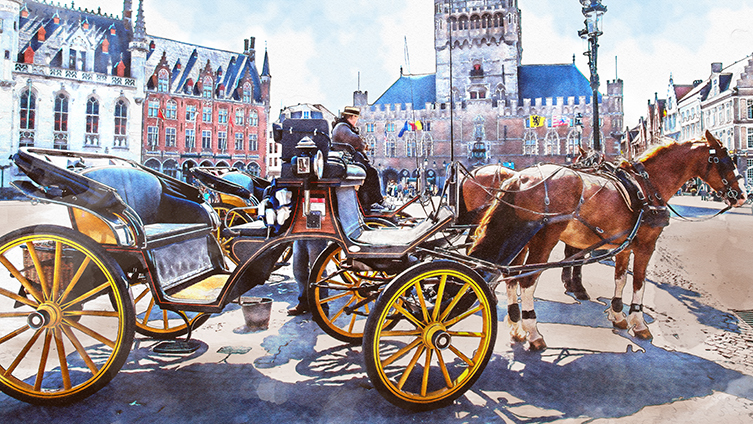The Girl From Saddler’s Row – Episode 45

LATE March was here before Rudge was able to make the journey south. What with the snowbound state of the roads and other business demands, some delay was inevitable.
He put his time to good use and managed to discover the whereabouts of the Plymouth branch of the Dawne family, with whom Emma Trigg’s mother had stayed on her visits.
On arrival at Plymouth he booked a room at the Fisherman’s Arms on the Barbican. Rested after a comfortable night and having breakfasted well, Rudge set off along the narrow, cobbled streets of the town to locate the address in his notebook.
Everywhere rang to the sound of the oily slap of water against wooden jetties, the distant boom of the sea and the raucous screeching of seabirds overhead.
He found it at last; a pleasant house on a quiet square. His summons was answered by an elderly female servant.
“Sir? Can I help you?”
“Indeed.” Rudge removed his hat and gave her a smile. “Would Mr Caspar Widdecombe be at home? I have need to speak with him.”
“Well . . .”
Indecision sat on the woman’s face and Rudge, handing over his business card, continued hastily.
“Tell him I am here with regard to the late Verity Dawne.”
The servant shuffled off and was back promptly.
Rudge was shown into a pretty, over-warm drawing-room. Sitting on a couch was a white-haired lady in a gown of dove-grey. She had a sweet face from which lavender-blue eyes surveyed Rudge anxiously.
Her husband, a once-handsome man whose expression indicated some apprehension, lost no time in asking Rudge what this was all about.
Rudge, taking a proffered seat opposite the couple, explained.
“I am investigating the disappearance of one Emma Trigg on behalf of her family. Her mama, I believe, visited here during her girlhood.”
A look passed between the couple.
“Ah, Verity,” the woman said on a sigh.
Her husband patted her hand in sympathy.
“I think,” he said slowly to Rudge, “that this might take some time. Perhaps some refreshment would be in order. Sir, your legs are younger than mine. Would you have the goodness to walk over and pull the bell?”
Over an excellent mid-morning repast of coffee and delicious little iced cakes that Rudge’s sweet tooth could not resist, he listened to what his host had to say.
“Mary-Jane and I were not blessed with children. Verity was the daughter we never had. She must have been eleven or twelve when she first spent the summer with us, and she came every year after that. Fascinated by the harbour and the ships, she was. And ride? She was an excellent horsewoman.”
The Widdecombes’ ostler, a man called Baxter, was enlisted to chaperone Verity out riding and it was inevitable that a bond was forged between the two.
“She grew into a very lovely young woman,” the wife put in. “She laughed a lot. Made us feel young again.”
Rudge hesitated, and then broached the delicate subject of the liaison with the unknown seafarer.
“There was an admirer, a mariner of some description? There were unfortunate consequences.”
Caspar Widdecombe nodded.
“That is so. A hard time it was for us. Mary-Jane and I felt responsible for what happened. But I swear, sir, the assignations were kept very quiet. Neither of us had an inkling of what was going on.”
“That is so,” Mary-Jane endorsed with a nervous glance at her spouse.
Rudge hesitated.
“I fear I must be frank here. If you would prefer to leave us, madam?”
“No, no.” The dimpled white hands fluttered. “Nothing can be done for Verity now, God rest her dear soul. But this – Emma, you say? This is her daughter!”
She looked beseechingly at her husband.
“Caspar, we must endeavour to assist Mr Rudge all we can.”
“Of course, my love.”
Caspar Widdecombe delivered her hand another pat before meeting Rudge’s gaze resolutely.
“Baxter’s your best chance. I always suspected the old rogue knew more about what went on than he would say.
“Unfortunately the years have caught up with him and he’s no longer in our service. You’ll find him at this address. ’Tis a fisher cottage on the sea front.”
Taking down the details, Rudge experienced the tingling of nerve endings that generally signified an encouraging move forwards.













